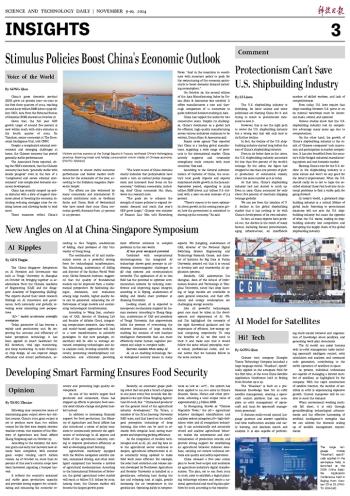
The China-Singapore Symposium on AI Frontiers and Governance was held at Tongji University in Shanghai on October 28, bringing together 14 academicians from the Chinese Academy of Engineering (CAE) and the Singapore Academy of Engineering (SAEng). The experts shared their latest research findings on AI innovation and governance, both nationally and globally, revealing some interesting new perspectives.
"AI+" model accelerates scientific revolution
Today, generative AI has become a widely used productivity tool. By improving the accuracy and efficiency of radar perception technology, it has been applied in smart healthcare for fall detection, vital sign monitoring, and sleep monitoring. In radio frequency chip design, AI can improve design efficiency and circuit performance, according to Guo Yongxin, academician of SAEng, chair professor at City University of Hong Kong.
The combination of AI and mathematics serves as a powerful driving force for technological transformation. Yan Shuicheng, academician of SAEng and director of the Kunlun World Wide 2050 Global Research Institute, suggested that the quality of foundational models can be improved from a mathematical perspective. By facilitating dialogue, discussion, and evaluation among large models, higher-quality data can be generated, enhancing the effectiveness of large models and accelerating technological transformation.
According to Wang Jian, academician of CAE, director of Zhejiang Lab and founder of Alibaba Cloud, integrating computation-intensive, data-driven, and model-based approaches will lead to a new transformation in scientific paradigms. In this new paradigm, researchers will be able to leverage advanced computing technologies and data analysis tools, boosting scientific discovery, promoting interdisciplinary collaboration and ultimately providing more effective solutions to complex problems in the real world.
AI has great untapped potential
Combined with computational electromagnetics, the integrated AI technology shows great promise in addressing electromagnetic challenges in 3D chip systems and communication networks. The application of AI in this field has the potential to optimize communication systems by reducing interference and improving signal integrity, according to Li Erping, academician of SAEng and Qiushi chair professor at Zhejiang University.
Looking ahead, AI is expected to incorporate mechanisms inspired by human memory. According to Zheng Qinghua, academician of CAE and president of Tongji University, this improvement holds the promise of overcoming the inherent limitations of large models, enabling the creation of new machine intelligence frameworks that can more effectively mimic human cognitive processes and adapt to complex tasks.
Exercise caution when using AI
AI, as an enabling technology, faces widespread security issues in many aspects. Wu Jiangxing, academician of CAE, director of the National Digital Switching System Engineering and Technology Research Center, and director of Institute for Big Data at Fudan University, pointed out that it is crucial to develop safe and trustworthy AI application systems.
Similarly, CAE academician Dai Qionghai, dean of the School of Information Science and Technology at Tsinghua University, noted that deep learning or large models are unreliable in open general scenarios, and their efficiency and energy consumption are challenging energy security.
Like all powerful technologies, great care must be taken in the development and deployment of AI. Wu and Dai highlighted the necessity of the right theoretical guidance and the importance of efficient, low-energy optical computing respectively. To reap the benefits of AI, we first need to trust it and make sure that it would follow the same ethical principles, moral values, professional codes, and social norms that we humans follow in the same scenario.


 Next
Next




